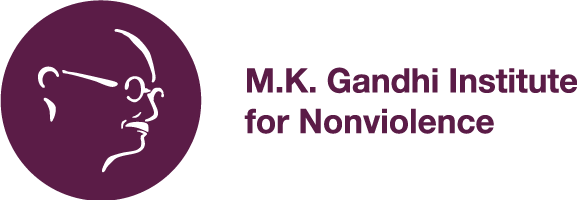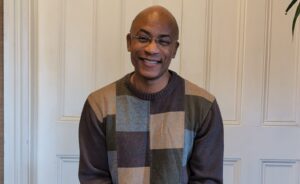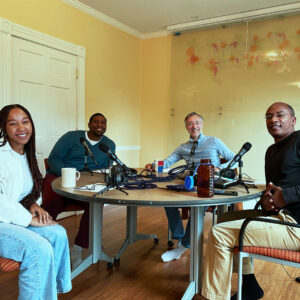I’ve got a bit of a Hidden Brain obsession. For those of you who don’t know, Hidden Brain is an NPR podcast hosted by Shankar Vedantam. He “uses science and storytelling to reveal the unconscious patterns that drive human behavior, shape our choices, and direct our relationships.” (NPR Choice Page, 2020)
While making dinner, washing dishes, folding laundry, or other tedious household chores, I listen to whatever new episode I haven’t heard yet. If there are no updates, I go into the archives and find one. My hunger for the human condition knows no bounds. Even during this pandemic when we are all advised to distance ourselves socially, I remain inquisitive.
Before the Coronavirus changed the way we interacted with one another, I helped to lead my students each day with affirmations. “I am a thinker. I am a scholar. I am a leader.” A curious second grade student asked me, “what am I supposed to think about?”
Good question!
This Hidden Brain mix is fodder for all those thinkers out there who’ve had the same questions my student had. The next time you wonder what might be good to contemplate during this time of social distancing, try out any of the links below. This is just a fraction of what this series has to offer, and from this fraction are episodes that have helped me in my work with children, peace-building, and self-care.
The Empathy Gym is, by far, my favorite recommendation. If you only have time for one episode today, start with that one. In recognition of our current crisis, I also listed the newest episode at the very end. If you’re anxious about this epidemic and can’t absorb or process more information about illness, wait to listen to it. I invite you to reach out afterward. I’d love to hear your thoughts!
You 2.0: The Empathy Gym (53:11)
Some people are good at putting themselves in another person’s shoes. Others may struggle to relate. But psychologist Jamil Zaki argues that empathy isn’t a fixed trait. This week: how to exercise our empathetic muscles. It’s the first episode in our You 2.0 summer series.
You 2.0: Our Better Nature (26:53)
If you live in a big city, you may have noticed new buildings popping up — a high-rise here, a skyscraper there. The concrete jungles that we’ve built over the past century have allowed millions of us to live in close proximity, and modern economies to flourish. But what have we given up by moving away from the forest environments in which humans first evolved? This week, we revisit our 2018 conversation about the healing power of nature with psychologist Ming Kuo.
You 2.0: Tunnell Vision (36:41)
When you’re hungry, it can be hard to think of anything other than food. When you’re desperately poor, you may constantly worry about making ends meet. When you’re lonely, you might obsess about making friends. This week, as part of our You 2.0 series, we bring you a favorite 2017 episode about the psychological phenomenon of scarcity. Researchers say this form of tunnel vision can affect our ability to see the big picture and cope with problems in our lives.
Guys, We Have A Problem: How American Masculinity Creates Lonely Men (48:58)
Boys get the message at a young age: don’t show your feelings. Don’t rely on anyone. This week, we bring you a favorite 2018 episode about misguided notions of masculinity in the United States. We explore how these notions create stressed-out romantic relationships, physical health problems, and a growing epidemic of loneliness. Plus, we consider how we might begin to tell a different story about what it means to be a man.
Zipcode Destiny: The Persistent Power Of Place And Education (52:12)
There’s a core belief embedded in the story of the United States — the American Dream. Today we look at the state of that dream as we revisit our 2018 conversation with economist Raj Chetty. We’ll ask some questions that carry big implications: can you put an economic value on a great kindergarten teacher? How is it that two children living just a few blocks from each other can have radically different chances in life? And what gives Salt Lake City an edge over Cleveland when it comes to offering people better prospects than their parents?
What’s Not on the Test: The Overlooked Factors that Determine Success (45:17)
Smarts matter. But other factors may play an even bigger role in whether someone succeeds. This week, we speak with Nobel Prize-winning economist James Heckman about the skills that predict how you’ll fare in life. We’ll also look at programs that build these skills in the neediest of children – and new research that suggests the benefits of investing in kids and families can last for generations.
On the Knife’s Edge: Using Therapy to Address Violence Among Teens (27:28)
What would drive someone to take another person’s life? When researchers at the University of Chicago asked that question, the answer was a laundry list of slights: a stolen jacket, or a carelessly lobbed insult. It made them wonder whether crime rates could be driven down by teaching young men to pause, take a deep breath, and think before they act. In this 2017 episode, we go inside a program that teaches Chicago teens to do just that. We also explore what research has found about whether this approach actually works
Panic in the Streets: How Psychology Shaped the Response to an Epidemic (26:12)
It sounds like a movie plot: police discover the body of a young man who’s been murdered. The body tests positive for a deadly infectious disease. Authorities trace the killing to a gang. They race to find the gang members, who may also be incubating the virus. This week on Hidden Brain, we revisit our 2016 story about disease, panic, and how a public health team used psychology to confront an epidemic.
NPR Choice page.(2020). Retrieved 2 March 2020, from https://www.npr.org/podcasts/510308/hidden-brain




